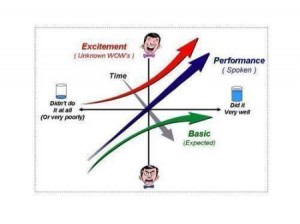Why Six Sigma Fails Detroit
Michigan desperately needs innovation to be competitive. When Japan started using Statistical Process Control (SPC) now known as Six Sigma, it was a competitive differentiator. In other words Japanese auto makers used quality and lean process as an innovation. Detroit has been feverishly implementing Six Sigma but they are still losing ground to the Japanese and now the Koreans and soon to be China. Why?
Six Sigma is a great thing but doing it as a “me-too”? only creates commoditization. Worse yet, the entire process of Six Sigma is about doing the same thing cheaper and cheaper. That leaves you in a death spiral to the lowest priced product, and little or no profits. Does that sound familiar?
Detroit, Michigan and the USA in general need innovation. Everyone knows that but almost no one is really doing it. The main reason is they don’t know how. What if innovation could be as predictable and systematic as Six Sigma? What if a company could create practical, profitable innovations on demand? Does that sound fantastic? Impossible?!? It is fantastic and it’s absolutely possible.
Predictive Innovation makes innovation:
- Efficient
- Low-Risk
- Controllable
- Repeatable
- Competitive
- Reliable
- Just-In-Time
Rather than looking at innovation as a magical creative activity it uses the very well defined study of System Theory and new breakthroughs in Information Theory to create a step-by-step process for innovation. How systematic is it? How about knowing there are 7 specific elements to innovate in any product or service and there are 15 types of alternatives for each element? When you realize that, you are guaranteed 105 innovations targeted precisely to your business needs and your customer’s desires.
When you use Predictive Innovation you can create an innovation strategy that causes your profit margins to increase overtime, risks to decrease and eliminate the threat of any competition.
Predictive Innovation has been used to create entire families of products, increase the value of investments, and solve seemingly impossible problems. It’s been applied to manufacturing, software, medicine, marketing, security, business strategy, politics, and entertainment.
Alternative to Closing for Legendary Greek Restaurant
The 80 year old owner of Detroit’s oldest Greek restaurant New Hellas Cafe, Gus Anton, is shutting the business down claiming he needs the rest and can’t keep up with it any more. Surely he deserves to retire after 57 years of running the business his father started in 1901. Unfortunately shutting the business down means 35 people lose their jobs. Anton say he hopes the workers will get rehired if the restaurant is sold. He said, “he doesn’t have anyone to take over. His son is ill and one of his grandchildren wants to be a plumber, the other a doctor.”
How about selling it to the employees?
I realize that business has been way down but I suspect the people working there need their jobs and know how to run it without Gus. I also suspect the business is still profitable. I suggest that Mr. Anton either sell the business and the building to the employees or lease it to the employees while he is attempting to sell the building. Since he was planning on closing the doors he doesn’t seem to need the money right away. This would give the loyal worker a chance to improve their lives and save Gus and his family some money, and maybe even make a bit more. Perhaps the employees turned owners have some ideas to make the business more successful.
Venerable Greek restaurant in Detroit to shut doors
New Hellas restaurant closes after 107 years
Finding Gold in the Closet at the Detroit Economic Club
Today when I attended the presentation by Gary Shapiro to the Detroit Economic Club I uncovered opportunities that were being overlooked. Mr. Shapiro, president of the Consumer Electronic Association, encouraged Detroit to embrace free trade agreements and use innovation to meet the challenges of increasing competition. He was absolutely correct, however as so many others beating that drum, he failed to explain how to innovate. Many of the attendees left feeling even more pressure.
Oddly enough, everyone of the people I spoke to were using the same failing approach to competition and every single one was overlooking huge profits from using resources they already own. Profits from things they currently considered expenses.
Two companies I spoke with were trying to improve efficiency in hopes of lowering prices. The first was a tool and die company that was implementing 6 Sigma to find ways to improve process efficiencies. This is a good thing. I was one of the founders of using statistical process control (SPC) in the USA back in the 1980s. If the company was typical they could expect 10-30% improvements. This would make many managers very happy. But they were actually wasting their time and energy. They had 4 very expensive machines sitting idle. They were probably losing $400,000 per year in missed revenue. More importantly if they just made $1 more from those machines it would be INFINITE improvement in efficiency. They are currently getting zero efficiency. The machines are collecting dust and wasting space. Any money they make from those machines is infinite increase in efficiency.




 Predictive Innovation Training
Predictive Innovation Training Predictive Innovation: Core Skills Book
Predictive Innovation: Core Skills Book RoundSquareTriangle.com
RoundSquareTriangle.com